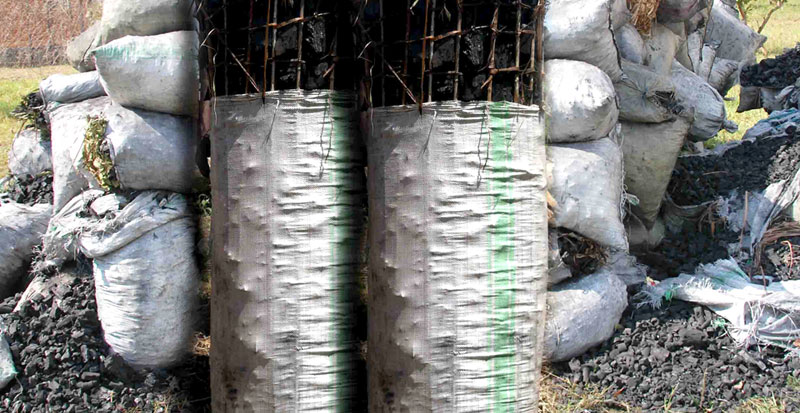- A single Mvule tree provides oxygen for up to 10 people a year
- Cut down several trees and you commit genocide
Someone once said that trees are the lungs of the earth. You couldn’t perhaps find a better statement to describe the delicate but harmonious relationship we humans have with trees. When trees breathe, they take in carbon dioxide and give us oxygen in return.
Simply put, trees clean up the air that we breathe of some of the most dangerous gasses they therefore maintain environmental balance and thereby make our lives enjoyable and sustainable.
Take the example of a Mvule tree. An average 100 year old Mvule for instance provides up to 6,600 kilograms of oxygen for living creatures during that period. This means that a mature Mvule can produce enough oxygen for 10 people for a year.
Cutting down a single Mvule tree endangers the lives of 10 people who are deprived of oxygen, not to mention other benefits. Cut down a hundred trees and you condemn a village. Cut down a forest and you are committing genocide; aside from destroying wild-life habitats as well as reservoirs of essential medicines.
Sadly, through deforestation, Ugandans are powering furiously fast on this deadly road of no return. The level of deforestation, especially of natural forests that kept millions of carbon for years, should be a source of worry for whoever cares about their tomorrow or that of their children and grandchildren.
A recent report by the National Environment Management Authority (NEMA) cautioned that Uganda could lose the rest of its forest cover by the year 2050. That is, within a generation, the country’s entire forests will be gone, unless dramatic steps are taken to reverse the situation. Contemplating the effects of this can send a chill down your spine.
The overwhelming 94 percent of Ugandans who rely on wood fuel and charcoal for cooking has set off alarm bells for many people. It means that the cost of energy is set to sore rapidly. But this will be accompanied by several environmental disasters such as disruptions in rainfall patterns and hence food shortages especially for a country like ours that so depends on rain-fed agriculture.
Increased temperatures will likely lead to the multiplication of disease pathogens that attack crops and humans. Scientists have also warned that the destruction of forests where potentially dangerous diseases once lived in latent form could make them virulent resulting into fierce outbreaks such as Ebola.
And when you pose to think about all this, you could say tree fellers should perhaps use the timber for making their own coffins before hand.
Hacking down a living tree to produce charcoal, one is initiating endless cycles of murder no one can ever tell. The logger is innocently condemning the lives of uncountable species of living things.
And experts have warned that although not the only cause of climate change, it is a major contributor to the dangerous global phenomenon whose effects are already being felt in tropical regions such as Uganda.
Scientists estimate that forest loss and other changes to the use of land account for around 23% of current man-made carbon dioxide emissions – which equates to roughly 17% of the 100-year warming impact of all current greenhouse-gas emissions.
The impact of the charcoal industry in Uganda’s once believed to be the most stunning of all Africa’s vegetation is despairing.
Surely, if one day, the spirit of one Sir Winston Churchill, who constantly referred to Uganda as the Pearl of Africa could return, we can’t know what the late would make of how rapidly the country has lost it’s beautiful ecosystem to, primarily energy.
The use of wood fuel and charcoal is deeply rooted in both Uganda’s household and industrial energy mix that several attempts to cut its production often meets resistance. In Gulu district, charcoal burners in January only played hide-and-seek with the local authorities trying to impose a mere month ban.
More burning can’t help heal the already raped lands. But just how will the entire population, almost, survive without a reliable alternative energy source? Will the small solar panels visible on few roof tops of villagers produce enough energy for cooking food?
According to some reports, Uganda loses over 73,000 hectares of forest cover annually, which has critically catalyzed the impacts of global warming in the land-locked country: fields that no longer grow… erratic and harsh weather conditions such as extremely hot days, have their seeds in a falling tree.
Every year our atmosphere loses around 10 billion cubic metres of oxygen, replacing it with carbon dioxide that would absorbed by flora. Knowing this should help us appreciate the vital contributions made by trees.
Experts have calculated that a hectare of well-working forestry annually absorbs about 6.5 tons of carbon dioxide while releasing 3.5 to 5 tons of oxygen.
For all of human history until around the dawn of the age of fossil fuels that came with the industrial revolution. Back then, the world had a balance between oxygen and carbon dioxide.
With limited renewable energy of poor nations, the demand for the fossil fuel have swelled and our carbon-emissions have soared exponentially. As a result, there is now a dangerously high amount of carbon in the atmosphere.
Cut down forests for fossil fuels and you are doing no service to humankind. You are a blight, not a blessing, on civilization; and the face of this Earth – you are burning the future.








